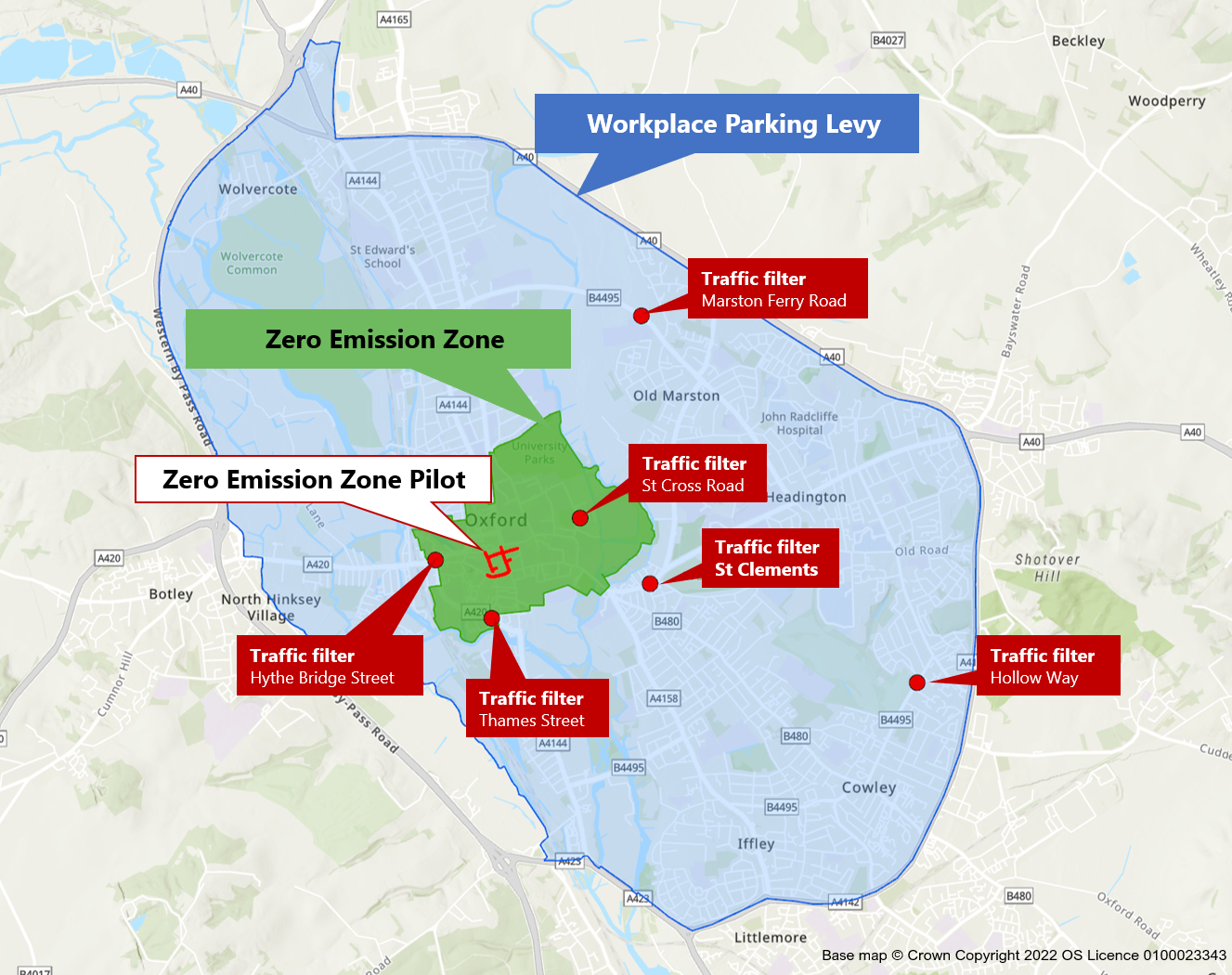Councils announce ambitious updated proposals to support a zero carbon transport network
Plans to create a sustainable and reliable transport system in Oxford have been announced. The proposals will see the introduction of a city wide workplace parking levy, traffic filters and a wider zero emission zone, together with improved public transport and cycle routes.
Over the coming months, Oxfordshire County Council and Oxford City Council will engage with businesses, service providers, hospitals, transport providers, schools and town and parish councils to gather suggestions and feedback on the proposed schemes.
Consultations on these proposals will take place in late summer 2022, with the schemes to be implemented between 2023 and 2024. The plans will support people to walk, cycle and make faster journeys by public transport. By changing the way people travel in and around Oxford, the schemes will also help reduce air pollution, create healthy communities and reduce traffic levels across the city.
The new proposals include:
- Workplace parking levy: The councils are proposing to extend the Workplace Parking Levy (WPL) to cover employers across the city. By law, money raised by the levy must be spent on improving transport in the city.
- Traffic filters: Six traffic filters are proposed on certain roads to reduce traffic congestion, improve bus journey times and create safer routes for cyclists and pedestrians.
- Zero Emission Zone (ZEZ): The councils propose to extend the ZEZ from the current pilot area to cover the entire city centre.
Transport emissions currently account for 17% of greenhouse gas emissions in Oxford. In order to achieve a zero carbon transport network in the city by 2040, a 30% reduction in the use of vehicular transport through increases in cycling, walking, home-working, car sharing and car clubbing is needed.
Councillor Duncan Enright, Oxfordshire County Council’s Cabinet Member for Travel and Development Strategy, said: “The climate emergency and inequalities across the county and city mean Oxford needs a more sustainable and reliable transport system for everyone.
“We want to make walking, cycling and using public transport the first choice for people. The new plans will not only help us move towards a progressive transport network in the city, but they will also improve the quality of all our lives.
“Oxford has always been a leader in innovation and these new plans will help us move towards a zero-carbon transport system in the city, while making Oxford a safer, cleaner and better place for people who live and work here and for those who visit.
“While the county council is leading the development of these plans together with the city council, we also intend to work with key partners such as our businesses, universities and bus operators.”
Councillor Tom Hayes, Deputy Leader and Cabinet Member for Green Transport and Zero Carbon Oxford, Oxford City Council, said: “Gridlocked traffic is bad for everyone – it is bad for residents, bad for the economy, and bad for the environment. Our air must be cleaner to protect our health. Our energy must be cleaner to protect our futures. As well as tackling air pollution and our climate crisis, everyone must be able to move swiftly and simply from A to B. Citizens have lives to lead and they want to enjoy the best possible health and transportation, and to look to the future with hope.
“That’s why we’re expanding the planned workplace parking levy across the city and the zero emission zone to the whole city centre, as the city council has long called for. In closer partnership, both councils are throwing our weight behind our critically important bus network. We must back Oxford’s buses to recover from the pandemic and move around the city without significant delays, and that must take place immediately and, with these plans, over the medium-term.
“Everyone in the city struggles with the same congestion choking their roads, worries about the air they breathe, and looks to our climate future with nervousness. We all want to fix our problems—by proposing these plans, both councils want to speak directly to citizens and organisations over the next few months ahead of further public consultation later this year. We want everyone to have their say.”
Initial engagement on a workplace parking levy and traffic filters took place in 2019. Consultations on temporary city centre bus gates took place in 2020. Since then, the two councils have been working together to enhance these proposals drawing on feedback from over 10,000 residents, businesses and community groups, as well as the continuing climate emergency and the impact of COVID-19 on the way people travel.
Funding for these schemes will come from various sources. The county council is actively applying for grants from the government such as the zero emissions transport cities bid. It is also currently awaiting the outcome of its Bus Service Improvement Plan (BSIP) submission, as well as a bid to the government’s Zero Emission Bus Regional Areas (ZEBRA) scheme for funding to support the delivery of more than 150 new electric buses in Oxford.
The two councils will be hosting a series of online webinars to introduce these schemes in more detail and answer questions. It is recognised that exemptions and discounts will be appropriate in certain circumstances and the engagement process will inform the approach to these taken by the councils. Detail about how to sign up for these will be provided on the council’s website and social media in the coming months.
More information can be found at: Core transport schemes for Oxford | Oxfordshire County Council

